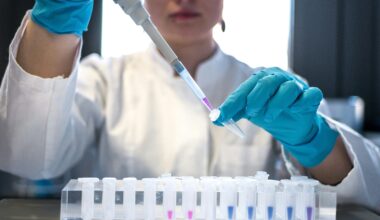Tempest Therapeutics, Inc. (NASDAQ:TPST) is a clinical-stage biotechnology company pioneering dual-action cancer therapies that combine direct tumor targeting with immune system activation. Headquartered in Brisbane, California, the company’s mission is to develop small-molecule drugs that not only inhibit cancer cell metabolism but also reprogram the tumor microenvironment to restore the body’s natural anti-tumor response. Its lead candidate, amezalpat (TPST-1120), is a first-in-class PPARα antagonist that has gained strong global momentum after receiving regulatory clearance in the U.S., Europe, and China to begin a pivotal trial in first-line hepatocellular carcinoma (HCC) — one of the world’s deadliest cancers. The drug has also been granted Fast Track and Orphan Drug designations by the U.S. FDA and Orphan Drug Designation by the EMA, highlighting its potential to transform liver cancer treatment. At the 2025 AACR Annual Meeting, Tempest presented new mechanism-of-action data showing amezalpat’s ability to suppress tumor metabolism and boost immune cell activity, reinforcing its promise as a novel therapeutic option for patients with limited choices.
Alongside amezalpat, Tempest is advancing TPST-1495, a dual EP2/EP4 receptor antagonist targeting prostaglandin-mediated inflammation and immune suppression, which has earned Orphan Drug Designation from the FDA for familial adenomatous polyposis (FAP). The company’s growing portfolio reflects its strategy of developing small molecules with broad applicability across both solid tumors and rare genetic cancers. Financially, Tempest remains focused on efficiency, ending the second quarter of 2025 with $14.3 million in cash and equivalents, supported by a $4.6 million registered direct offering and at-the-market proceeds to extend its runway. Under the leadership of President and CEO Stephen Brady, Tempest continues to explore strategic alternatives, including partnerships and licensing opportunities, to maximize shareholder value and accelerate late-stage development. With pivotal trials underway and multiple regulatory designations secured, Tempest Therapeutics is emerging as one of the most promising small-cap oncology innovators in the immune-metabolic therapy space.
Tempest Therapeutics: Turning Strategic Struggles Into a High-Conviction Oncology Comeback
Tempest Therapeutics, Inc. (NASDAQ: TPST) is quietly building one of the most promising precision oncology portfolios in the small-cap biotech space. Despite its size and recent cost-cutting moves, the California-based company continues to make measurable scientific progress, securing major regulatory milestones in the U.S., Europe, and China. With two first-in-class candidates — amezalpat (TPST-1120) and TPST-1495 — advancing through late-stage development, Tempest is positioning itself as a potentially undervalued player in the immuno-oncology market, where validated clinical results could drive significant upside for both patients and investors.

CHECK THIS OUT: Tiziana (TLSA) Surges 143% in 2025 and Immuneering (IMRX) Reports 86% 9-Month Survival in Pancreatic Cancer.
Amezalpat Advances to Global Pivotal Stage in Liver Cancer
Tempest’s lead candidate, amezalpat (TPST-1120), is spearheading its resurgence. The company recently received clearance from Chinese regulators to proceed with a pivotal Phase 3 trial evaluating amezalpat in combination with atezolizumab and bevacizumab for first-line hepatocellular carcinoma (HCC). This follows similar approvals from the U.S. FDA and the European Medicines Agency (EMA), marking a major step forward in the global expansion of its late-stage oncology program. The trial aims to validate amezalpat’s dual mechanism of action — both as a PPARα antagonist that disrupts tumor metabolism and as an immune-modulating agent that enhances the body’s anti-tumor response.
At the 2025 AACR Annual Meeting, Tempest presented compelling new preclinical and translational data reinforcing this dual mechanism. The findings highlighted amezalpat’s ability to reshape the tumor microenvironment by reducing immune suppression and promoting T-cell infiltration, a feature that could make it a valuable partner in combination regimens with checkpoint inhibitors. Such synergy gives amezalpat the potential to stand out among HCC therapies, particularly in an indication where therapeutic options remain limited and survival rates are poor.
Further strengthening its regulatory profile, the EMA granted Orphan Drug Designation for amezalpat in HCC, complementing prior Orphan Drug and Fast Track designations from the FDA. These designations underscore the therapy’s clinical potential and unlock expedited development pathways and market exclusivity — key advantages for any emerging oncology player.
TPST-1495 Expands Tempest’s Footprint in Rare Diseases
While amezalpat drives the company’s near-term catalysts, Tempest’s second major program, TPST-1495, continues to attract attention for its innovation in prostaglandin receptor biology. The FDA granted Orphan Drug Designation to TPST-1495 for the treatment of familial adenomatous polyposis (FAP), a rare genetic condition that predisposes patients to colorectal cancer. This recognition highlights the program’s potential beyond oncology, opening pathways into precision immunology and hereditary cancer prevention.
TPST-1495 targets EP2 and EP4 receptors, which play critical roles in cancer-promoting inflammation and immune evasion. By simultaneously blocking both pathways, the drug aims to restore immune activity and curb tumor-promoting prostaglandin signaling — a differentiated approach that positions it favorably against single-pathway inhibitors. As data matures, Tempest could leverage TPST-1495 to expand its reach across multiple solid tumor types, including colorectal and gastric cancers.
Financial Position: Focused Capital Efficiency Amid Strategic Realignment
Tempest’s financial update for the second quarter of 2025 paints a picture of cautious but deliberate fiscal management. The company ended the quarter with $14.3 million in cash and equivalents, compared to $30.3 million at the end of 2024. While cash burn remains a key investor concern, the decline reflects the funding required to prepare for its pivotal Phase 3 HCC trial. Importantly, Tempest raised additional capital through a $4.6 million registered direct offering and an at-the-market (ATM) program that added another $2.8 million in net proceeds.
For the quarter, net loss was $7.9 million ($2.07 per share) — an improvement from the $9.6 million ($5.52 per share) loss recorded in Q2 2024. Research and development expenses dropped to $3.9 million from $5.8 million year-over-year, reflecting a strategic pivot toward key late-stage programs and reduced overhead from prior layoffs. Meanwhile, general and administrative expenses slightly increased to $4.1 million, primarily due to one-time separation costs. For the first six months of 2025, Tempest reported a net loss of $18.7 million ($5.17 per share), modestly higher than the $17.5 million loss during the same period in 2024.
Despite these figures, the company’s restructuring demonstrates a focus on preserving cash runway while seeking strategic alternatives — including partnerships, mergers, or licensing deals — to accelerate its programs and maximize shareholder value. The combination of a leaner operating model and a late-stage oncology asset puts Tempest in a strong negotiating position for potential collaborations.
Strategic Alternatives: A Path Toward Value Creation
In a high-stakes biotech environment where capital efficiency is paramount, Tempest’s decision to explore strategic alternatives reflects pragmatism rather than weakness. The company aims to unlock greater shareholder and patient value through potential partnerships or acquisitions that could provide access to commercial infrastructure, non-dilutive funding, and expanded market reach. With clear regulatory momentum in three major regions — the U.S., Europe, and China — Tempest is positioned to attract interest from larger oncology players seeking to strengthen their liver cancer portfolios.
Why the Bull Case Is Building Momentum
Tempest’s bullish narrative rests on three pillars: clinical validation, global expansion, and strategic optionality. Its dual-acting mechanisms differentiate its pipeline in an increasingly crowded immuno-oncology landscape. The clearance to initiate a pivotal global trial, coupled with Orphan Drug designations across key markets, provides tangible proof of regulatory traction. Meanwhile, the company’s disciplined financial approach and openness to partnerships mitigate some of the typical risks faced by small-cap biotech firms.
If amezalpat’s pivotal trial demonstrates statistically significant efficacy in first-line HCC, the potential market impact could be substantial. The liver cancer market, valued at more than $10 billion annually, remains underserved by existing therapies. Even a modest market share for amezalpat could dramatically increase Tempest’s valuation. Combined with the optional upside from TPST-1495 in FAP and other cancers, Tempest stands on the edge of what could become a transformative period in its corporate history.
Outlook: A Lean Biotech Positioned for Leverage
Tempest Therapeutics has evolved from a struggling micro-cap into a focused, data-driven oncology developer with clear global ambitions. The next 12 to 18 months will be critical as it seeks partners, advances amezalpat through pivotal testing, and readies TPST-1495 for further validation. While financial pressures remain, the science is solid, the regulatory tailwinds are strong, and the company’s disciplined execution provides a foundation for renewed investor confidence.
In a biotech landscape where innovation and capital discipline rarely coexist, Tempest Therapeutics is proving that a lean, scientifically rigorous model can still create meaningful value. With multiple designations, a pivotal trial underway, and strategic alternatives in play, the company’s next breakthrough may not just be in the lab — but on Wall Street.
READ ALSO: Saudi Arabia Wants CEL-SCI (CVM)’s Multikine Now! and Aligos Therapeutics (ALGS) Doubles Cash to $122.9M.








